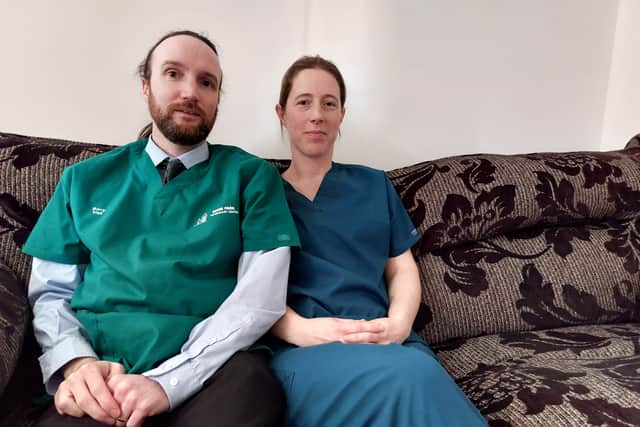'Let-down' parents fear whooping cough outbreak in Sunderland over concerns the disease is not being diagnosed or reported
and live on Freeview channel 276
Parents in Whitburn say they feel “very let down” and “don’t understand” why doctors appeared reluctant to diagnose whooping cough in their children and are failing to test and notify authorities of the disease which could potentially lead to an outbreak being undetected.
This is despite whooping cough being highly contagious, potentially dangerous for pregnant women and even fatal in babies, particularly under six months old.
Advertisement
Hide AdAdvertisement
Hide AdVets Bryony and Rory Thomson, both 37, have endured a “really stressful” couple of months after doctors at their own surgery and Newcastle RVI failed to diagnose the disease and dismissed it as the’100 day cough’ or the “coughs and colds which children get”.
Rory and Bryony’s daughter first became ill in early December but was diagnosed with a cough which had exacerbated her asthma. However the cough worsened and on Christmas Eve the 10-year-old turned blue after struggling to catch her breath.


Bryony, who works as a vet at King Road Veterinary Practice in Sunderland, said: “It was the middle of the night and she was gasping for air. She actually started to turn blue. It was very stressful and we were really concerned.”
Rory and Bryony took their daughter to Newcastle RVI where they were told by a consultant paediatrician that “resources are not available to test every 10 year old with a cough” and attempts were made to reassure them by explaining that his son “has had a cough for over three weeks” and that further testing was unnecessary.
Advertisement
Hide AdAdvertisement
Hide AdIn January, Rory and Brony returned to their GP practice where they were referred to a children’s respiratory consultant, but still no diagnosis of whooping cough was made.
At this point the couple’s six-year-old daughter also started to develop a cough.
Rory, who works as a practitioner at Roker Park Veterinary Centre, said: “We asked if we should cancel her birthday party. We were advised it was probably viral and she should be fine.
“The earliest we could be assessed by a respiratory nurse was the end of January, three weeks away.
Advertisement
Hide AdAdvertisement
Hide Ad“We did get a phone assessment by an NHS children's respiratory consultant who said it’s likely to be whooping cough or a virus causing whooping cough-like symptoms, yet no physical assessment or specific treatment was provided.”
At this point Rory and Bryony decided to pay for a private consultant who diagnosed whooping cough. Tests were taken and both children were confirmed as having the disease, over a month after initially showing symptoms.
The couple’s third daughter has now developed symptoms and been confirmed to have the disease.
The children attend Whitburn Village Primary School and Rory and Bryony are both concerned about a potential outbreak of the disease due to children not being correctly diagnosed and subsequently continuing to attend school, mix with other children and spread the potentially dangerous disease.
Advertisement
Hide AdAdvertisement
Hide AdHe said: "My daughters are fully vaccinated, which is possibly why it was not strongly considered as possible in the earlier stages.
“It’s recognised that lifelong immunity to whooping cough does not exist following vaccination and immunity will start to wane 2-3 years after the last booster.”
Science data analysis company Airfinity said there have been 1,416 recorded cases nationally since the start of January, representing a 24-fold increase on the same period last year.
Airfinity say infections remain on the rise in all regions of England and Wales, although the South East and London have seen the largest spike, reporting an 82 and 52 per cent increase in cases over the last week.
Advertisement
Hide AdAdvertisement
Hide AdRory fears if whooping cough is not being diagnosed and subsequently reported, despite being a legally notifiable disease, then case numbers could potentially be far higher, including here in Sunderland.
He said: “The problem is likely to be much worse than has been reported and there’s evidence we are experiencing a whooping cough pandemic.
“Although there’s a legal obligation to report whooping cough, similar to covid-19, from our experience, it’s not getting done.
“With Covid-19, tests were getting done and results reported within days. Our daughters started showing signs in December, were notified in January but have only got the positive test results confirming the disease in February. “Speaking to parents at the school gate, many people have been told they and their children have the ‘100 day cough’.
Advertisement
Hide AdAdvertisement
Hide Ad“They have children with persistent coughs for weeks, yet none of them have been reported.
“My daughter had been examined by two GPs, a junior doctor, two paediatric consultants, all of whom speculated the involvement of whooping cough before dismissing it.
“Medical practitioners are not following their legal obligation to report suspected cases. From our experience in A&E that includes for their own family.
“Our surgery has been very supportive throughout this ordeal, however they did not have the back-up or support from the paediatric respiratory service to achieve a timely diagnosis for us on theNHS.”
Advertisement
Hide AdAdvertisement
Hide AdBryony added: “I’ve no idea why it’s being referred to as the 100 day cough. Maybe by calling it this term they're trying to manage expectations as people are less likely to go back to their GP.”
In their role as vets the couple are used to dealing with infectious diseases and the protocol and restrictions which need to be adhered to in order to restrict its spread.
Bryony said: “Any notifiable disease we have to report straight away. Farms can be isolated and restrictions on movement put in place. This is what makes this situation all the more confusing and difficult to understand.”
One of the parents Rory spoke with was Jill Cunningham, 53, whose daughter is in the same class as Rory’s daughter.


Advertisement
Hide AdAdvertisement
Hide AdThe 11-year-old developed a cough over the Christmas period but didn’t go to the doctors.
However Jill, who's on tablets to suppress her immune system, began experiencing bouts of violent coughing.
She said: “I looked at the symptoms on the NHS website and everything suggested whooping cough. I phoned the doctors who arranged a pharmacy appointment and they said it’s not a notifiable disease, which is incorrect.
“I eventually got to see a doctor at a surgery in Boldon and it was dismissed as a chest infection.
Advertisement
Hide AdAdvertisement
Hide Ad“It didn’t go away and so I went to my doctors in Whitburn and it was confirmed as whooping cough.
“I’m not sure why I had to go through all of this to get a diagnosis. I’m sure I caught it from my daughter and if I’d known it was whooping cough I would have kept her off school so she wasn’t mixing with other children.”
The Echo contacted both the NHS and the UK Health and Security Agency (UKHSA) and put to them the experience of Rory, Bryony and Jill. We also asked about the potential of a whooping cough epidemic.
Obviously for case numbers to be accurate is dependent on the disease being accurately diagnosed and reported as legally required, whether confirmed or suspected cases.
Advertisement
Hide AdAdvertisement
Hide AdA UKHSA spokesperson said: “Typically we see increases in whooping cough activity every 3-4 years. Whilst there has been a rise in notifications of cases in the North East and across the country in recent months, activity is not as high as in previous years and we have not seen any recent clustering of cases in the North East.
“While lab-confirmed cases of whooping cough are on the rise, they currently remain lower than the pre-pandemic years, where cases of most diseases including whooping cough reduced hugely due to the restrictions in place and people’s behaviours.”
A key reason for any increase in numbers could be a reduction in people taking up the vaccine.
The spokesperson added: “Uptake of the whooping cough vaccine in pregnant women, babies and young children has fallen in recent years.
Advertisement
Hide AdAdvertisement
Hide Ad“It's important to remember that before the introduction of routine immunisation there were large epidemics of whooping cough every two to three years affecting tens of thousands of people and many deaths.
“The vaccine programme has been hugely successful with a dramatic reduction in cases, but the infection hasn’t gone away completely as neither infection nor vaccination can provide life-long protection.
“But the reduction in vaccine uptake over the past decade will leave some people more susceptible and we are likely to see cases increase.
“Whooping cough is of particular concern in young babies when it can cause more severe illness. Vaccinations to prevent whooping cough are routinely given to infants and pre-school children and doses are required at 8 weeks, 12 weeks, 16 weeks and 3 years and 4 months in order to be fully protected.
Advertisement
Hide AdAdvertisement
Hide Ad“Vaccination is also routinely offered to pregnant women, who pass on protection to their baby in the womb and is the best way to protect new-born babies who are at highest risk of more severe illness in the early weeks before they are able to be vaccinated.”
The UKHSA also said the 100 day cough is not a term used by themselves or the NHS.
Details about symptoms and what to do if you or your child has whooping cough can be found on the NHS website.
Comment Guidelines
National World encourages reader discussion on our stories. User feedback, insights and back-and-forth exchanges add a rich layer of context to reporting. Please review our Community Guidelines before commenting.